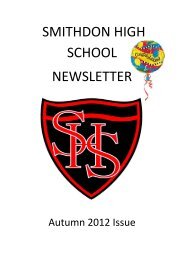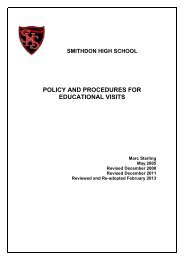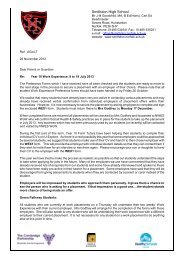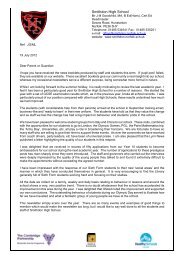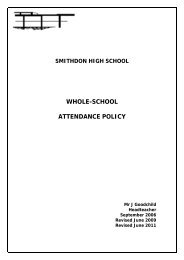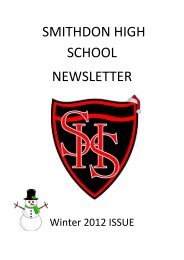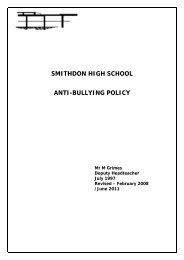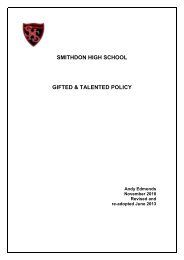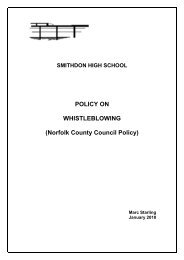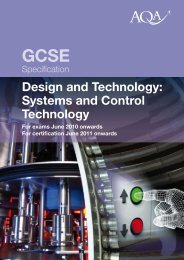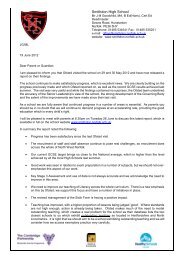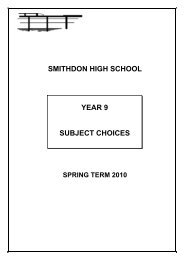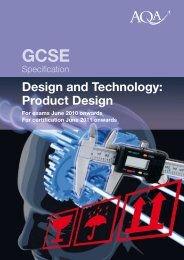School Prospectus - Smithdon High School, Hunstanton, Norfolk
School Prospectus - Smithdon High School, Hunstanton, Norfolk
School Prospectus - Smithdon High School, Hunstanton, Norfolk
You also want an ePaper? Increase the reach of your titles
YUMPU automatically turns print PDFs into web optimized ePapers that Google loves.
<strong>Smithdon</strong> <strong>High</strong> <strong>School</strong><br />
<strong>Prospectus</strong>
Contents<br />
Page<br />
1 Welcome from the Headteacher and Mission Statement<br />
2 Mathematics and Science<br />
3 English and Modern Foreign Languages<br />
4 Geography and History<br />
5 ICT and Design & Technology<br />
6 Music and Drama<br />
7 Art and Religious Education<br />
8 Physical Education and Well-being<br />
9 Sixth Form<br />
10 Special Educational Needs and Disability Provision<br />
11 <strong>School</strong> Productions and Events<br />
12 Extra-curricular<br />
13 <strong>School</strong> Council and Parent Partnership<br />
14 Governors<br />
15 Rewards<br />
16 <strong>School</strong> Structure<br />
17 <strong>School</strong> Uniform
Welcome<br />
By reading and looking through the pages of this prospectus I hope you will begin to gain an idea of what motivates<br />
us as a school, what we believe in and the wealth of opportunities we offer to our students. Our guiding principles<br />
are academic excellence and personal fulfilment within a forward looking and disciplined environment based on<br />
mutual respect.<br />
We believe passionately in giving our students the right tools to function as learners in the 21st century and that the<br />
development of appropriate technologies is fundamental to achieving this. We recognise that we live in the<br />
present day and that our education must be relevant, up-to-date, and appropriate for the 21st century. We are<br />
forward looking and recognise that we have the privilege of preparing our young people to become responsible<br />
adults in the world of tomorrow.<br />
Our school has a team of enthusiastic and dedicated staff who provide first class learning opportunities within the<br />
classroom and also give generously to provide an array of extra-curricular opportunities too - a truly all round<br />
education. So that you can make a fully informed choice for your child’s future please take the opportunity to visit<br />
our school on the Prospective Parents’ Evening or the Open Mornings.<br />
Jon Goodchild<br />
Mr Jon Goodchild - Headteacher<br />
“There are lots of opportunities at <strong>Smithdon</strong>.” - Year 10 student<br />
Mission Statement<br />
At <strong>Smithdon</strong> <strong>High</strong> <strong>School</strong> we endeavour to provide education of the highest quality, enabling all our students<br />
to develop fully their potential as learners and members of local, national and international communities.<br />
General school aims<br />
• To provide high quality teaching and opportunities for learning.<br />
• To develop self respect, confidence and esteem.<br />
• To engender respect for every member of the school, local, national and international communities.<br />
• To encourage and provide every member of the school community with the opportunity to continue their<br />
progression in terms of career advancement and/or learning.<br />
• To make a positive contribution to the local community through liaison with a wide variety of organisations.<br />
• To strive for excellence in all aspects of our work.<br />
1
Science<br />
Mathematics<br />
Science fires pupils’ curiosity about phenomena in the world around them and offers opportunities to find<br />
explanations. At <strong>Smithdon</strong> <strong>High</strong> <strong>School</strong> science begins with a variety of short courses. These courses are<br />
developed in-house and aim to deliver the National Curriculum in the context of everyday life.<br />
The course includes all three science disciplines - biology, chemistry and physics - and provides the pupils with<br />
opportunities to carry out practical activities and educational visits. Science is now a skill based subject and pupils<br />
are aided in developing, modelling, expressing opinions and debating as well as experimental writing skills.<br />
Pupils learn how knowledge and understanding in science are rooted in evidence. They discover how scientific<br />
ideas contribute to technological change - affecting industry, business and medicine, and improving quality of life.<br />
They trace the development of science worldwide and recognise its cultural significance. They learn to question and<br />
discuss issues that may affect their own lives, the directions of societies and the future of the world.<br />
At <strong>Smithdon</strong> <strong>High</strong> <strong>School</strong> we have a team of dedicated teachers as well as great facilities and resources to inspire<br />
pupils in their science studies.<br />
2<br />
Mathematics is the key to all those professions which demand knowledge of the exact sciences. It teaches<br />
abstract thought in an accurate and orderly way.<br />
Mathematics is not only the perfect subject for reflecting intellectual abilities, but also a tool for solving vital,<br />
everyday problems. At <strong>Smithdon</strong> <strong>High</strong> <strong>School</strong> we cater for the whole spectrum of abilities, from those pupils who<br />
wish to be consultants in high powered companies where mathematics is used to maximise profit making, to those<br />
who will need to manage their own finances in an ever more demanding world.<br />
We have produced pupils who have revelled in abstract ideas and have risen to the challenges presented by higher<br />
level university courses. Functional mathematics to Pythagoras’ Theorem and beyond are all catered for by our<br />
department as we explore number, algebra, shape and space as well as statistics.<br />
The department’s position in the centre of the school, housed in a dedicated refurbished mathematics block with the<br />
latest interactive whiteboard technology, excellent range of software, integrated ICT suite and laptops, make this an<br />
exemplary department.<br />
“Our form tutors support and encourage us to do well.” - Year 9 student
English<br />
English language, both written and spoken, means confidence in life. English is the medium by which nearly all of<br />
us lead our lives. At <strong>Smithdon</strong> <strong>High</strong> <strong>School</strong> we therefore believe it is vital that every student secures the basic skills<br />
which will enable them to both understand and engage in the world around them.<br />
These skills are developed through a structured programme of study which is supported and enhanced by<br />
reading. As all educational research shows, reading for pleasure is a vital part of your child’s development and we<br />
ask parents to support our efforts to encourage this. As students progress, we strive to develop their fluency and<br />
analytical skills as well as an understanding and enjoyment of our literary heritage. These skills will equip them for<br />
higher education and employment, where the ability to communicate well is essential.<br />
Enrichment activities include visits to a number of venues such as The Globe Theatre and visits to the school by<br />
well known authors, as well as a number of school based, extra-curricular opportunities. The department’s excellent<br />
facilities housed in a purpose built and attractive teaching base close to the school’s outstanding library and ICT<br />
facilities all play a significant role in supporting the development of pupils’ knowledge and skills.<br />
“I’ve settled in well. <strong>Smithdon</strong> is big but not scary at all.” - Year 7 student<br />
Modern Foreign Languages<br />
Modern Foreign Languages have practical communication at the core of their learning philosophy.<br />
Endless lists of vocabulary are of little use if pupils do not possess the skills to use these words in everyday<br />
situations. Communication is key and making the occasional mistake is all part of the process. We equip our<br />
students with the skills to take their language studies out of the classroom and into the world, whether it is for the<br />
purpose of work, pleasure or further study.<br />
Modern Foreign Languages will play a key role in the new, knowledge-based economy of the future. In addition to<br />
the considerable economic advantages gained by a workforce competent in a foreign language, the social benefits<br />
should also be recognised. It is most important to show people in other countries the courtesy of speaking to them<br />
in their own language.<br />
People who can speak another language, or at least have a good working knowledge, can hope to be more<br />
successful in gaining employment and command higher salaries within their organisations. Languages expand the<br />
mind, but shrink the world.<br />
3
History<br />
Geography<br />
History fires pupils’ imagination, inspiring them with the dilemmas, choices and beliefs of people in the past. It<br />
helps pupils develop their own identities through an understanding of history at personal, local, national and<br />
international levels. It helps them to ask and answer questions of the present by engaging with the past.<br />
They develop a chronological overview that enables them to make connections across different periods and<br />
societies. They investigate Britain’s relationships with the wider world, and relate past events to the present day.<br />
As they develop their understanding of the nature of historical study, pupils ask and answer important questions,<br />
evaluate evidence, identify and analyse different interpretations of the past, and learn to substantiate any<br />
arguments and judgements they make.<br />
History prepares pupils for the future, equipping them with vital knowledge and skills, enhancing employability and<br />
developing an ability to take part in a democratic society. We strongly believe that students at <strong>Smithdon</strong> <strong>High</strong> <strong>School</strong><br />
are enthused by their study of history and that a love of the subject becomes a feature of their lifelong learning.<br />
4<br />
Geography stimulates interest and a sense of wonder, helping young people to make sense of a complex and<br />
dynamically changing world. This subject explains where places are, how landscapes are formed, how people and<br />
their environment interact and how a diverse range of economies, societies and environments are interconnected.<br />
Pupils build on their own experiences to investigate locations on all scales, from the personal to the global.<br />
Geographical enquiry encourages questioning, investigation and critical thinking relating to issues affecting the<br />
world and people’s lives, both now and in the future. Fieldwork is an essential element of geography studies and at<br />
<strong>Smithdon</strong> we are fortunate to have such interesting coastline right on our doorstep to enhance our students’<br />
education and understanding of the subject.<br />
Pupils learn to think spatially and use maps, visual images and new technologies including geographical information<br />
systems (GIS) to obtain, present and analyse information.<br />
Geography inspires pupils to become global citizens by exploring their own part of the world, as well as their values<br />
and responsibilities in relation to other people, the environment and the sustainability of the planet.<br />
“The field trips are really good fun.” - Year 11 student
ICT<br />
Information Communication Technology plays an ever increasing role in today’s society, from the<br />
mobile phone to presentations given by companies in the form of advertisements and government policies.<br />
With the understanding acquired in ICT, students are aware of the unseen pressures used and learn how to apply<br />
persuasive techniques to help them compete in the world of business and commerce. Alongside these skills<br />
students develop others, including the use of spreadsheet and database in accommodation that creates a<br />
businesslike environment and inspires students to achieve to their highest potential.<br />
The school has developed an ICT network throughout the school which is unparalleled in terms of pupil access.<br />
This technology has had a profound and growing impact on pupils’ success in this subject. In addition ICT lies at the<br />
centre of pupils’ learning across the curriculum providing opportunities to transfer ICT skills into different areas and<br />
further develop computing confidence.<br />
“It’s great we get to use the computer rooms in all subjects.” - Year 9 student<br />
Design and Technology<br />
Design and Technology is based in excellent, purpose-built accommodation with a suite of five classrooms,<br />
each allocated to a specialist subject. The department has over forty computers, thirty of which are in a dedicated<br />
computer suite. With seven CAM machines and four computer projectors, we can offer a high technology input for<br />
students. The computer suite includes a range of subject specific software programmes to suit the needs of<br />
students from Year 7 to Year 13, so we are well placed for the future demands of the curriculum.<br />
The department has a team of dedicated and creative staff, with excellent technical support, who also offer students<br />
clubs and activities both at lunchtime and after school.<br />
We currently offer a wide range of GCSE level courses in which students experience success. We are also<br />
delighted to offer courses to A level.<br />
The enviable facilities and reputation of the department have set a standard which the technology team are<br />
determined to enhance still further.<br />
5
Drama<br />
Music<br />
Drama in Key Stage 3 includes thematic investigations incorporating dramatic strategies such as body language,<br />
still image, hot seating and improvisation. These studies are multimedia based, using music and video, CD Rom,<br />
etc. A selection of themes such as ‘Titanic’, ‘The Haunted House’, ‘War of the Worlds’, ‘Oregon Trail’ and ‘Forbidden<br />
Planet’ are studied.<br />
These areas of study allow students to develop their skills while enjoying and using dramatic strategies. A linked<br />
system of assessment is used to feed into GCSE and a clear system of tracking progress has been developed for<br />
both Key Stages 3 and 4. A clear structure of praise and reward is applied to great effect, as well as encouraging a<br />
positive atmosphere within lessons.<br />
A very important part of the department’s work has been the development of excellent productions. A tradition of<br />
large musicals performed in the school is now established and recent performances of ‘Jesus Christ Superstar’ and<br />
‘We Will Rock You’ received much acclaim. We are very proud that the department strives for excellence and this is<br />
reflected in the standard of performance seen in both the extra-curricular and lesson based activities.<br />
6<br />
Music contributes to the development of pupils and to the school curriculum by providing a powerful and<br />
distinctive form of communication and expression.<br />
Music changes the way children feel, think and act. The teaching of music extends everyday experiences,<br />
providing opportunities and links between home, school and outside agencies.<br />
Within the department we work closely with a team of dedicated peripatetic instrumental teachers to offer the<br />
opportunity for students to learn specific musical instruments (piano, strings, brass, woodwind, guitar, drums and<br />
vocal) through the school. These lessons contribute to the extra-curricular activities offered to all pupils at lunch<br />
times and after school.<br />
Over the last few years the department has forged good community links with local organisations and is lucky to<br />
secure funding from the <strong>Hunstanton</strong> and District Festival of Arts for a variety of events. The department continues<br />
to build up an outstanding reputation in the area through its contribution to musical productions, concerts and<br />
performance in the community.<br />
“Citizenship days are fun and teach us about important issues.” - Year 8 student
Art<br />
Art and design encourages, through direct personal expression, imagination, sensitivity, conceptual thinking,<br />
powers of observation, analytical abilities and practical attitudes. It uniquely addresses those complex mental<br />
processes involving visual perception and aesthetic experience.<br />
Art is one of those subjects concerned with visual communication, aesthetic sensibility, sensory perception,<br />
emotional and intellectual development, physical competence and critical judgement.<br />
Its particular contribution is concerned with developing imagination and creativity; observation and the recording of<br />
visual images, and through this, the expression of ideas and feelings; the interpretation of visual images; the<br />
transformation of materials into images and objects; the skills of planning and visualisation; the intuitive, as well as<br />
the logical processes of designing; and the study of the work by artists, craftworkers and designers.<br />
The department has excellent resources to encourage students to reach their full creative potential. These include<br />
two kilns, a pottery wheel, a printing press and a computer suite equipped with Photoshop, as well as access to a<br />
photography suite with a dark room for traditional black and white photography.<br />
“Art is my favourite subject. It’s much more than just painting.” - Year 10 student<br />
Religious Education<br />
Religious Education places special emphasis on students valuing themselves and others. This is achieved<br />
through studying the role of the family and the community in religious belief and practice. The diversity within<br />
society is celebrated through understanding similarities and differences, combating prejudice and negative<br />
discrimination, as well as the need for human stewardship of the earth.<br />
Religious Education also recognises the changing nature of society, including changes in religious practice and<br />
expression and the influence of religion in the local and national community. Students are given the opportunity to<br />
develop their sense of identity and thus make a positive contribution to their local, national and international<br />
community.<br />
Students view this subject very positively as a result of the carefully organised curriculum, high quality subject<br />
delivery and high levels of success attained by pupils across the ability spectrum in public examinations.<br />
7
Well-being<br />
Physical Education<br />
Well-being lies at the centre of <strong>Smithdon</strong> <strong>High</strong> <strong>School</strong>’s philosophy and we work hard to achieve positive<br />
outcomes. Our work starts before the pupils arrive, with staff going out to visit pupils in their primary schools, having<br />
induction days and using older students in Year 7 form groups.<br />
Looking after the well-being of students continues with each year group having a specifically designated head of<br />
year who stays with their group of pupils until the end of Year 11. The form tutor also stays with their form group.<br />
<strong>Smithdon</strong> <strong>High</strong> <strong>School</strong> believes that the well-being of students depends on their fitness and health as well as a<br />
feeling of belonging and security.<br />
The food we provide at breaks and lunch times is of high quality and reasonably priced. The PE department<br />
ensures that the pupils have access to a varied and appropriate sports curriculum throughout their time at school,<br />
and this is further supplemented by extra-curricular opportunities. We take all issues relating to general health<br />
seriously, such as alcohol abuse, drugs, smoking and sexual health. Guidance is made explicit in science, RE and<br />
during citizenship events. Our links with health professionals make our delivery relevant and interesting.<br />
8<br />
Physical Education develops pupils’ competence and confidence to take part in a range of physical activities<br />
which become a central part of their lives, both in and out of school.<br />
Our curriculum at <strong>Smithdon</strong> <strong>High</strong> <strong>School</strong> enables pupils to enjoy and succeed in many kinds of physical activity.<br />
Pupils develop a wide range of skills, the ability to use tactics, strategies and compositional ideas to perform<br />
successfully. When pupils are engaged in an activity, they learn to analyse the situation and make decisions. They<br />
also reflect on their performance, as well as the performances of others, and find ways to improve. As a result they<br />
develop the confidence to participate in different physical activities and learn the value of healthy, active lifestyles.<br />
PE helps pupils to develop both personally and socially. They work as individuals and in groups or teams, developing<br />
a sense of fairness as well as personal and social responsibility. Pupils take on various roles and responsibilities,<br />
including leadership, coaching and officiating.<br />
The PE department benefits from outstanding facilities, which include sports hall, gym, extensive sports field and an<br />
indoor, heated swimming pool.<br />
“Our sports facilities are great. Especially the gym and pool.” - Year 8 student
Sixth Form<br />
It is self evident that in today’s world education must continue beyond sixteen. <strong>Smithdon</strong> <strong>High</strong> <strong>School</strong> facilitates<br />
this idea with a dynamic sixth form catering for a wide range of abilities through a diverse array of Level 2 (GCSE<br />
equivalent) and Level 3 (A Level equivalent) courses.<br />
Sixth form students are encouraged to enrich their experiences through a wide range of extra-curricular activities.<br />
Charity events, school productions, peer counselling, student mentoring, the Duke of Edinburgh’s Award scheme,<br />
Young Enterprise, events management, university visits, sporting events and the ‘Extended Project’ are just some of<br />
the activities on offer.<br />
Students receive expert guidance on subject choice during Year 11 to ensure their course matches their goals, and<br />
during Year 12 they are entered for AS units. Post-18 planning begins towards the end of Year 12, as decisions<br />
about Year 13 and beyond also need careful consideration.<br />
What you can study at <strong>Smithdon</strong> <strong>High</strong> <strong>School</strong> in the Sixth Form<br />
• Art & Design<br />
• Art & Design – Photography<br />
• Applied Business<br />
• Biology<br />
• Chemistry<br />
• Design Technology – Textiles<br />
• English Language & Literature<br />
• French<br />
• Geography<br />
• Health & Social Care<br />
• History<br />
• Information Technology<br />
• Mathematics<br />
• Music<br />
• Physics<br />
• Sociology<br />
• Sport & Physical Education<br />
• Travel & Tourism<br />
Please see our Sixth Form <strong>Prospectus</strong>, which is available from school and on the school web site, for further details.<br />
“The sixth formers are like extra adults in the school to help you.” - Year 7 student<br />
9
Special Educational Needs<br />
Special educational needs may affect students either throughout or at some time during their school life.<br />
The majority of needs are met within the mainstream curriculum, but some students will require additional help. The<br />
learning support department aims to ensure that all students with special educational needs are offered full and<br />
equal access to a broad, balanced and relevant education.<br />
They are also encouraged to participate fully in all school activities. In line with our code of practice, the department<br />
offers a variety of support systems to meet students’ needs. The learning support department works closely with<br />
students and their parents and with outside support and health services, as well as other professionals in order to<br />
respond to such needs.<br />
Many pupils are supported in class by a team of learning support assistants. No student receives SEN support<br />
unless prior discussion with parents has taken place and the headteacher and all teaching staff are kept fully<br />
informed of all students receiving support.<br />
“<strong>School</strong> dinners are healthy but tasty with lots of choice.” - Year 9 student<br />
Disability Provision<br />
Disability provision at <strong>Smithdon</strong> <strong>High</strong> <strong>School</strong> is something we take extremely seriously, as we are committed<br />
to offering equal opportunities to all of the children in our care. We have an active disability equality scheme and<br />
access plan which have been developed from departmental improvement planning and consultation with staff,<br />
parents and students.<br />
This enables us to address the needs of our current community users as well as anticipating future requirements. All<br />
students have access to the activities conducted in school and reasonable adjustments are made for students with<br />
disabilities engaging in school trips.<br />
If, as a prospective parent of a child with a disability, you have any concerns about the school’s provision for your<br />
child’s needs, please contact the school in the strictest confidence. In all cases we will do our best to plan for your<br />
child’s individual support requirements ensuring that their transition to <strong>Smithdon</strong> <strong>High</strong> <strong>School</strong> is as smooth as<br />
possible.<br />
10
<strong>School</strong> Productions<br />
<strong>Smithdon</strong> <strong>High</strong> <strong>School</strong> is fortunate to have thriving music and drama departments which are both deeply<br />
committed to providing students with an opportunity to perform. This philosophy results in students actively<br />
performing and evaluating performance in their lessons.<br />
However, both departments believe that students should have the opportunity to perform in front of wider<br />
audiences. This takes place in concerts and school events throughout the year. The culmination of this exciting and<br />
popular work is the annual school production.<br />
The production involves in excess of one hundred pupils and staff with a sequence of performances normally<br />
taking place in March. To date these productions have included ‘Discorella’, ‘The Little Shops of Horrors’, ‘We Will<br />
Rock You’, ‘Jesus Christ Superstar’ and ‘The Wizard of Oz’.<br />
Each production sees another leap in complexity, success and pupil involvement together with critical acclaim from<br />
our audiences.<br />
“<strong>School</strong> productions are better than the West End or Broadway!” - Year 9 student<br />
<strong>School</strong> Events<br />
<strong>School</strong> events at <strong>Smithdon</strong> <strong>High</strong> <strong>School</strong> are aimed at providing our students with the best possible<br />
opportunities to achieve curricular and examination success. However, we fully embrace the philosophy that our<br />
school must be more than simply ‘preparing for examinations’.<br />
We try to provide our pupils with opportunities during the school day and beyond to have broader educational<br />
experiences. <strong>School</strong> events designed to achieve these objectives include charity days/weeks, theatre and art<br />
gallery visits, trips abroad, visiting speakers, enterprise days, reward trips, curriculum enhancement, a thorough and<br />
full immersion in the world of work, musical workshops, sporting events and participation in team success, Young<br />
Enterprise and various other competitions.<br />
We are constantly delighted by the manner in which our pupils respond to these opportunities, representing the<br />
school in a polite and mature manner, working with staff to make the events successful and responding positively to<br />
the events organised.<br />
11
Extra-curricular<br />
Extra-curricular activities are made available<br />
to all our students and are varied, rewarding and<br />
fun. Everyone is encouraged to participate, as we<br />
believe sharing experiences plays an important<br />
role in a child’s development.<br />
Our diverse programme of opportunities outside<br />
the classroom encourage life-skills and stimulate<br />
self-discovery, risk-taking and adventure.<br />
There is an enormous variety of clubs and<br />
societies to choose from at <strong>Smithdon</strong> <strong>High</strong> <strong>School</strong><br />
including the Duke of Edinburgh’s Award, Young<br />
Enterprise, numerous sporting opportunities and<br />
many more.<br />
“There are lots of clubs to get invovled with at lunchtime.” - Year 8 student<br />
12
<strong>School</strong> Council<br />
The <strong>School</strong> Council meets once a month and is is made up of student representatives from every year in the<br />
school, to ensure the needs and concerns of all our age groups are heard equally.<br />
The students chair the meetings themselves, with staff and governors overseeing their discussions to assist with<br />
any queries the pupils may have regarding the topics that are important to them.<br />
Since its inception, the school council has affected many important decisions within school, such as the school<br />
uniform, the new school badge, the school’s recycling policy, an anti-smoking campaign and assisting in raising<br />
funds for charities both locally and nationally, to name just a few. In addition, <strong>Hunstanton</strong> Town Council has recently<br />
approached the school council, asking them to act as the youth council for the town of <strong>Hunstanton</strong> - a role the<br />
students have been very keen to take on with their usual energy and maturity.<br />
<strong>School</strong> councillors are elected by their peers and report back to their fellow students, ensuring that everyone at<br />
<strong>Smithdon</strong> <strong>High</strong> <strong>School</strong> has a voice.<br />
“I’m proud to be on the school council and to have my ideas heard.” - Year 10 student<br />
Parent Partnership<br />
Parent partnership creates a vital link between the school and its parents. The school is working hard to<br />
establish close ties with parents and we strongly believe that the quality of co-operation between home and school<br />
has a significant effect on a student’s performance and standards of achievement.<br />
Good communication is essential if the partnership is to work successfully and we are committed to strengthening<br />
this relationship through a number of channels:<br />
• Newsletters issued two or three times a term.<br />
• The student planner, which parents are asked to sign weekly.<br />
• Progress reviews and annual written reports to parents.<br />
• Parent partnership evenings.<br />
• Curriculum evenings.<br />
• The school’s website.<br />
• Parents’ Handbook.<br />
13
Governors<br />
The school’s governors form a dedicated team with a strategic role in setting aims and objectives, agreeing<br />
targets, budgets, policies and priorities and monitoring effectiveness. It also evaluates the school’s performance<br />
through results and data, outside agency reports and the <strong>School</strong> Development Plan. Governors also compile their<br />
own development plan and review this annually.<br />
The range of skills, experience and expertise among the governors is considerable and this enables the governing<br />
body to support the school across many areas and in various ways. For example, professional expertise supports<br />
subject areas, educational visits, pastoral issues, premises inspection and building projects. Each governor is linked<br />
to a subject department, a management team or year group.<br />
Governors attend all major school events and form an important link between parents and staff if third party contact<br />
is needed, and they can always be reached through the school or on parents’ evenings.<br />
The governors are an enthusiastic and dedicated group who enjoy the school’s successes and progress. However,<br />
they take the role of ‘critical friend’ very seriously and challenge the school’s senior leadership team on issues of<br />
performance and effectiveness.<br />
The current chairman of governors is Mark Little, who has two children at <strong>Smithdon</strong>. Should you wish to contact<br />
Mark regarding any aspect of governance or with any concerns, please do so via the school email address -<br />
office@smithdon.norfolk.sch.uk - marking your email ‘FAO Mark Little’, and he will contact you as quickly as<br />
possible.<br />
For further information, or if you are interested in becoming a governor in the future, please contact the Clerk to the<br />
Governors through the school.<br />
Governor Leadership Team<br />
• Chairman Mr M Little<br />
• Vice chair Miss J Elsley<br />
• Vice chair Mr H Griffiths<br />
A full list of governors can be found on the school website.<br />
14<br />
“We have improved our school by introducing recycling.” - Year 8 student
Rewards<br />
Rewards are vital in reaffirming to our students that we recognise and are proud of their achievements. At<br />
<strong>Smithdon</strong> <strong>High</strong> <strong>School</strong> we believe that students’ successes should be praised and celebrated, and we have several<br />
ways of recognising achievement, effort, progress and perseverance.<br />
We try to encourage students to do well by rewarding those who make good progress. Merits are awarded to Years<br />
7, 8 & 9 with Personal Achievement Records for Years 10 and 11, together with congratulatory postcards.<br />
End of term reward trips are also held for students whose behaviour and attendance have been very good. In<br />
addition, excellent attendance is celebrated.<br />
We would wish to be informed of any achievements out of school so that we can celebrate these. We celebrate<br />
student achievement in weekly and end of term assemblies. We have a series of very special days in July when<br />
parents are invited to join with us to celebrate the students’ many successes.<br />
We have recently introduced the <strong>High</strong> Fliers Club and the <strong>High</strong> Five Club, rewarding students who are not only<br />
achieving high levels of attainment, but also those students who are performing above their target grades.<br />
In addition the school has recently implemented a <strong>School</strong> Ambassador scheme, where Year 11 students apply to<br />
be ambassadors for the school and are interviewed by senior members of staff and school governors before being<br />
selected for the role. As well as representing their peers, these students also attend school functions and are given<br />
extra responsiblitites to reward their mature approach to school life.<br />
Our rewards schemes include:<br />
• SIM points<br />
• PARs<br />
• Reward trips<br />
• <strong>High</strong> fliers club<br />
• <strong>High</strong> five club<br />
• Attendance rewards<br />
• <strong>School</strong> ambassadors<br />
“I have my silver certificate for merits and I’m working for my gold.” - Year 7 student<br />
15
<strong>School</strong> structure<br />
<strong>Smithdon</strong> <strong>High</strong> <strong>School</strong>’s senior leadership team is responsible for the overall leadership of the school on<br />
a daily, weekly and yearly basis. They work with heads of department and heads of year to manage the learning<br />
programmes in school, in order to meet the school’s mission statement.<br />
Pastoral care is key to the happiness and well-being of our students. With that in mind, <strong>Smithdon</strong> <strong>High</strong> <strong>School</strong><br />
ensures, as best it can, that both form tutors and heads of year stay with the same group of children throughout<br />
their school life. This allows the students to build a close bond with the staff in those two key roles, giving<br />
consistency and understanding in our pastoral care of all the children.<br />
The progress of each student is monitored by the form tutors and the heads of year. Form tutors are responsible<br />
for establishing a happy, secure and supportive relationship with their tutor group and should be the first point of<br />
contact for parents.<br />
Senior Leadership Team<br />
• Headteacher Mr J Goodchild<br />
• Deputy Headteacher Mr A Edmonds<br />
• Assistant Headteacher Mrs S Dixon<br />
• Assistant Headteacher Mr M Starling<br />
Heads of Year (as of September 2012)<br />
• Year 7 Mr S Durrant<br />
• Year 8 Mrs J Stewart<br />
• Year 9 Mrs L Marks<br />
• Year 10 Mrs J Gascoigne<br />
• Year 11 Ms S Fairweather<br />
• Years 12/13 Mr S Chapman<br />
16<br />
“Students have respect for the teachers and they respect us.” - Year 9 student
<strong>School</strong> uniform<br />
<strong>Smithdon</strong> <strong>High</strong> <strong>School</strong> students wear their uniform with pride. The uniform was designed in consultation with both<br />
students and parents, and helps pupils identify with the school and assists in creating a sense of community.<br />
The importance of pupils presenting themselves to a high standard cannot be overemphasised. Parents will<br />
appreciate that the public make judgements about a school on the basis of how the pupils look and behave while<br />
wearing school uniform. We greatly appreciate your cooperation in the maintenance of good uniform standards and<br />
behaviour.<br />
<strong>Smithdon</strong> <strong>High</strong> <strong>School</strong> uniform<br />
• Black blazer with school badge embroidered on the breast pocket (from school supply only)<br />
• Black school tie with coloured stripe according to year (from school supply only)<br />
• Black trousers (not cords/jeans) in a traditional style<br />
• Plain white shirt (long or short sleeved)<br />
• Black V-neck jumper with school badge - optional (from school supply only)<br />
• Plain black socks<br />
• Black school shoes - shoes with sports logos are not permitted<br />
Options for girls<br />
• Plain black knee-length skirt (school skirts can be purchased from school)<br />
• Plain black trousers in a traditional style (no cords, jeans, linens, hipsters, skinny or flared bootleg trousers)<br />
• Plain black tights<br />
• Sensible black shoes (no high heels, platforms, sling backs or backless shoes). A maximum heel height of 5cm<br />
is offered as a suggestion. Shoes with sports logos are not permitted.<br />
For physical education lessons<br />
• Plain navy blue shorts<br />
• White/navy sports shirt with school logo (from school supply only)<br />
• Navy blue sweatshirt with school logo (from school supply only)<br />
• Light blue sports socks (can be purchased from school)<br />
• Sports trainers<br />
<strong>School</strong> uniform order forms are available from the school office or via the school website.<br />
“I feel much more businesslike in my new uniform.” - Year 8 student<br />
17
For any further information on the<br />
subjects within this prospectus or to<br />
arrange a meeting with the<br />
Headteacher, please contact:<br />
<strong>Smithdon</strong> <strong>High</strong> <strong>School</strong><br />
Downs Road<br />
<strong>Hunstanton</strong><br />
<strong>Norfolk</strong><br />
PE36 5HY<br />
email: office@smithdon.norfolk.sch.uk<br />
tel: 01485 534541<br />
www.smithdon.norfolk.sch.uk



